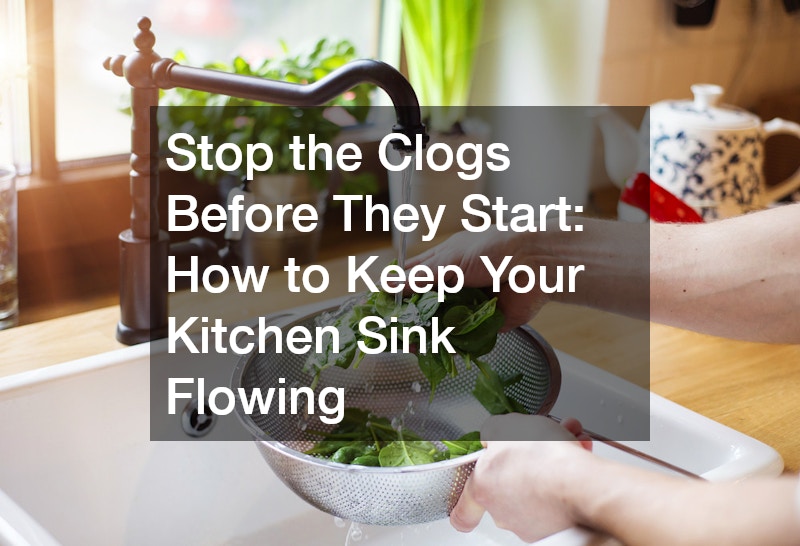In this article, we will discuss practical strategies to prevent a clogged kitchen sink and maintain a smooth-flowing drainage system. We will answer common questions and provide tips on care and maintenance. Knowing how to protect your sink can save both time and money in plumbing repairs.
The Best Preventative Measures for Sink Clogs
Regular Cleaning Practices
Developing regular cleaning routines is crucial in preventing debris and grease build-up. A daily quick rinse combined with a weekly deep cleaning can significantly improve the operational efficiency of your sink drainage. Ensuring no food residue is left to linger in the sink overnight will minimize the risk of clogs.
Another effective cleaning strategy involves using a mixture of baking soda and vinegar once a week. This combination helps break down minor obstructions and keeps the pipes clean. Regular flushing with hot water also prevents grease solidification, an often-overlooked clog precursor.
Establishing these practices as habits will contribute significantly to the longevity of your plumbing system. Avoid using harsh chemical drain cleaners, as they can lead to pipe damage over time. Instead, opt for environmentally friendly practices that preserve both your sink and the environment.
Tools and Accessories
Having the right tools and accessories is beneficial in maintaining a clog-free sink. Sink strainers are inexpensive and effective at catching larger debris before it enters the drain. Regularly emptying and cleaning these strainers ensures they work optimally.
Additionally, a plumber’s snake or drain auger can be indispensable in tackling minor clogs before they escalate. For those without these tools, a good plunger can also be of great utility for dislodging minor obstructions. Investing in an enzyme-based cleaner can provide additional protection without harsh chemicals.
Preventative accessories like foaming drain protectors help trap grease, preventing it from sticking to the pipes. Accessories tailored to fit your kitchen setup can enhance efficiency in clog prevention. These tools, though simple, can alleviate potential headaches associated with clogged drains.
Properly Dispose of Kitchen Waste
Foods to Avoid Putting Down the Sink
Certain food items, such as coffee grounds and eggshells, should never be thrown down the sink. These materials can accumulate, leading to blockages over time. Instead, consider composting these items as a greener disposal method.
Fats, oils, and grease, often abbreviated as FOG, are notorious for causing kitchen sink clogs. While liquids when hot, they can solidify in pipes as they cool, causing significant blockages. Disposing of FOGs in a heat-resistant container instead is a best practice to prevent clogs.
Additionally, fibrous foods such as celery, potato peels, and corn husks should be avoided as they can wrap around and jam disposal blades. These materials are not only hazardous for disposal but also contribute to pipe blockages. Being mindful of what gets washed down the sink is a proactive measure in clog prevention.
Effective Use of Garbage Disposals
Garbage disposals can process soft, small scraps effectively when used correctly. Always run cold water while using the disposal to help solidify grease, making it easier to chop and grind. Feeding the disposal slowly, avoiding overloading, will ensure its optimum performance.
Citrus peels can be ground periodically in the disposal to promote a fresh scent and clean the disposal blades. However, it is important to maintain a balance and not to overuse the disposal for all kitchen waste. Knowing the capacity and limitations of your garbage disposal extends its lifespan and prevents premature failure.
Regular maintenance of the disposal is essential, as is avoiding non-food items and expandable foods like rice and pasta. Grinding ice cubes occasionally can help sharpen and clean the blades. Following these guidelines ensures your garbage disposal remains a helpful tool rather than a source of plumbing issues.
What to Do if Your Sink is Draining Slowly?
Home Remedies to Clear a Slow Drain
A slow drain can often be resolved with simple home remedies before the issue necessitates professional intervention. Pouring a mixture of baking soda and vinegar down the drain can break down minor blockages while deodorizing. Follow this with boiling water to flush away loosened debris.
Salt and baking soda is another potent combination; let it sit in the drain overnight before rinsing. Sometimes, removing the sink’s P-trap and manually cleaning it can yield immediate results. Materials that resist these methods signal a more serious clog that may require further attention.
When to Call a Professional Plumber
Knowing when to call a professional plumber can save costly mistakes and prevent further damage. Persistent blockages or slow drainage that do not respond to home remedies require a plumber’s expertise. Unusual noises or unpleasant odors emanating from the sink warrant professional evaluation.
Water backup in other kitchen components or bathroom fixtures when running the sink can indicate systemic plumbing problems. Plumbers bring specialized tools and knowledge to address these complex issues efficiently. Hiring a professional at the first sign of major trouble can prevent exacerbating the problem.
By implementing these preventive measures and understanding effective waste disposal, you can keep your kitchen sink flowing smoothly. Good habits and regular maintenance form the backbone of an efficient clog prevention strategy. Remember to act promptly at the first sign of a problem to avoid more severe clogs, preserving both your kitchen’s functionality and your peace of mind.

